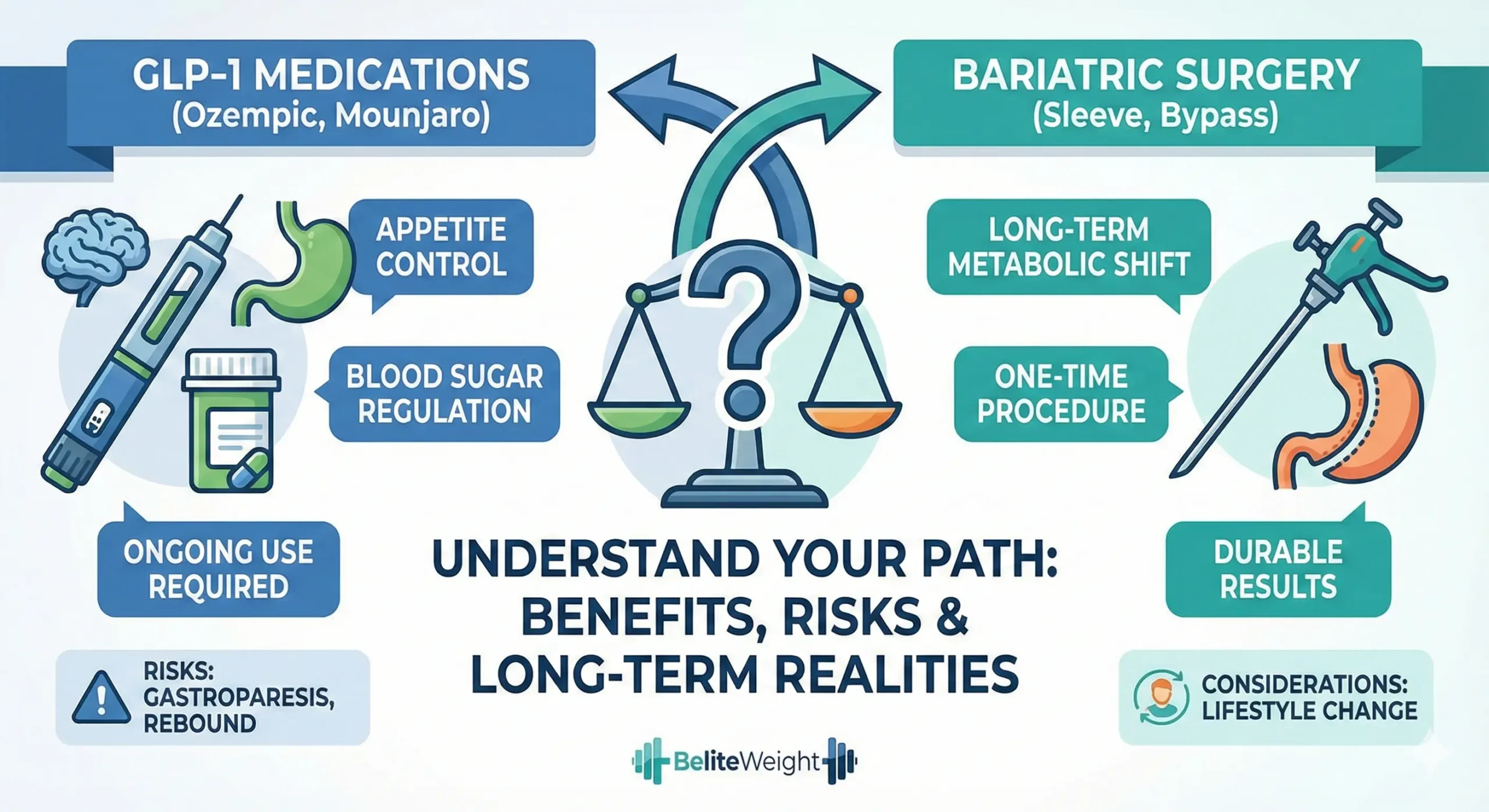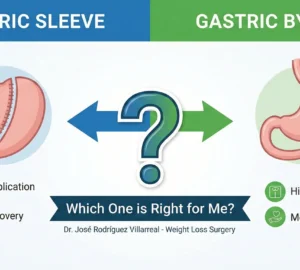GLP-1 Medications—What You Need to Know Before You Start
GLP-1 receptor agonists—such as Ozempic, Wegovy, and Mounjaro—have rapidly become the hottest trend in weight-loss medicine. Their effectiveness is real, but so are the risks, costs, and long-term considerations that many advertisements leave out.
At BeliteWeight, we help patients understand all their options, including how GLP-1 medications compare to powerful long-term solutions like the Gastric Sleeve and Gastric Bypass. This guide will help you decide which path may be best for you.
What Are GLP-1 Medications?
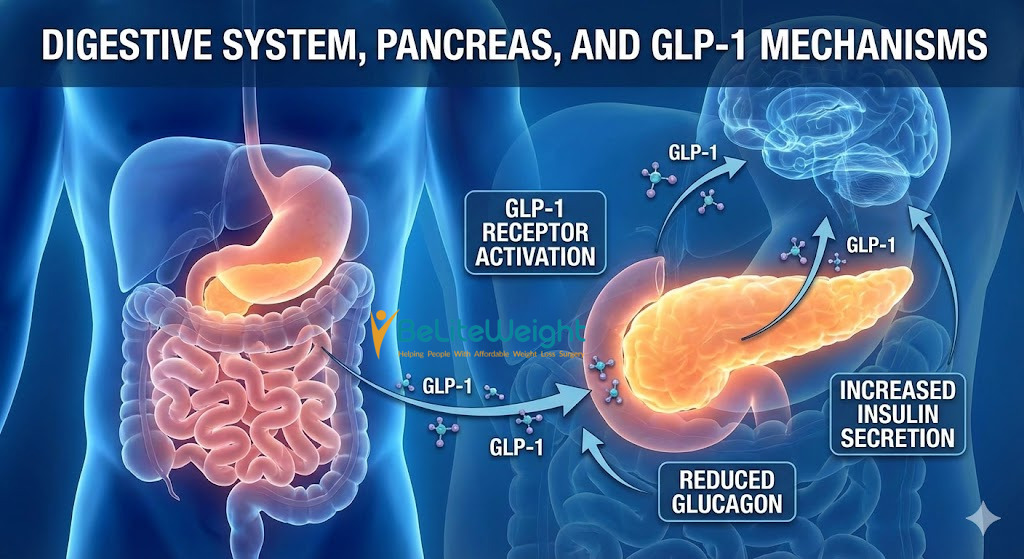
GLP-1 (glucagon-like peptide-1) receptor agonists work by mimicking a natural gut hormone that helps:
-
Regulate blood sugar
-
Slow stomach emptying
-
Suppress appetite
-
Increase feelings of fullness
Popular GLP-1 medications include:
-
Semaglutide: Ozempic, Wegovy
-
Tirzepatide: Mounjaro, Zepbound
Originally developed for diabetes, they’re now widely prescribed for weight loss.
Who Are GLP-1s Best For?
These medications may be appropriate for:
-
Individuals with BMI ≥ 30
-
Individuals with BMI ≥ 27 with conditions such as diabetes, sleep apnea, or hypertension
-
Patients who need medical support after years of unsuccessful dieting
They are not ideal for casual or cosmetic weight loss. Optimal results typically require long-term or even lifelong use.
Benefits of GLP-1 Medications
Significant Weight Loss
Clinical trials show GLP-1 medications can help people lose 15–20% of their body weight.
(Reference: STEP Trials — NIH/PubMed: https://pubmed.ncbi.nlm.nih.gov/33571824/
Metabolic Improvements
GLP-1s can help improve:
-
A1C levels
-
Blood pressure
-
Triglycerides
-
Insulin sensitivity
Powerful Appetite Control
By slowing digestion and changing hunger hormones, GLP-1s reduce cravings and help patients feel satisfied with smaller portions.
Risks & Side Effects: The Full Picture
While many influencers promote GLP-1s as an “easy fix,” they come with meaningful risks.
Common Side Effects
-
Nausea
-
Vomiting
-
Constipation or diarrhea
-
Bloating
-
Early fullness
More Serious Potential Risks
Gastroparesis (Delayed Gastric Emptying)
A critical concern, especially with long-term use.
Symptoms include:
-
Chronic nausea
-
Vomiting undigested food
-
Painful fullness
-
Abdominal discomfort
Some patients recover after stopping the medication; others experience lasting issues.
Gallbladder Problems
Rapid weight loss increases the risk of:
-
Gallstones
-
Cholecystitis
Pancreatitis
Rare but serious. Requires immediate medical care if suspected.
Muscle Loss
Rapid weight loss can include muscle loss—especially if protein intake is low.
Rebound Weight Gain
A well-documented issue.
One key study found that 67% of lost weight returned within a year of stopping semaglutide.
(Reference: Wilding et al., PubMed: https://pubmed.ncbi.nlm.nih.gov/35441470/
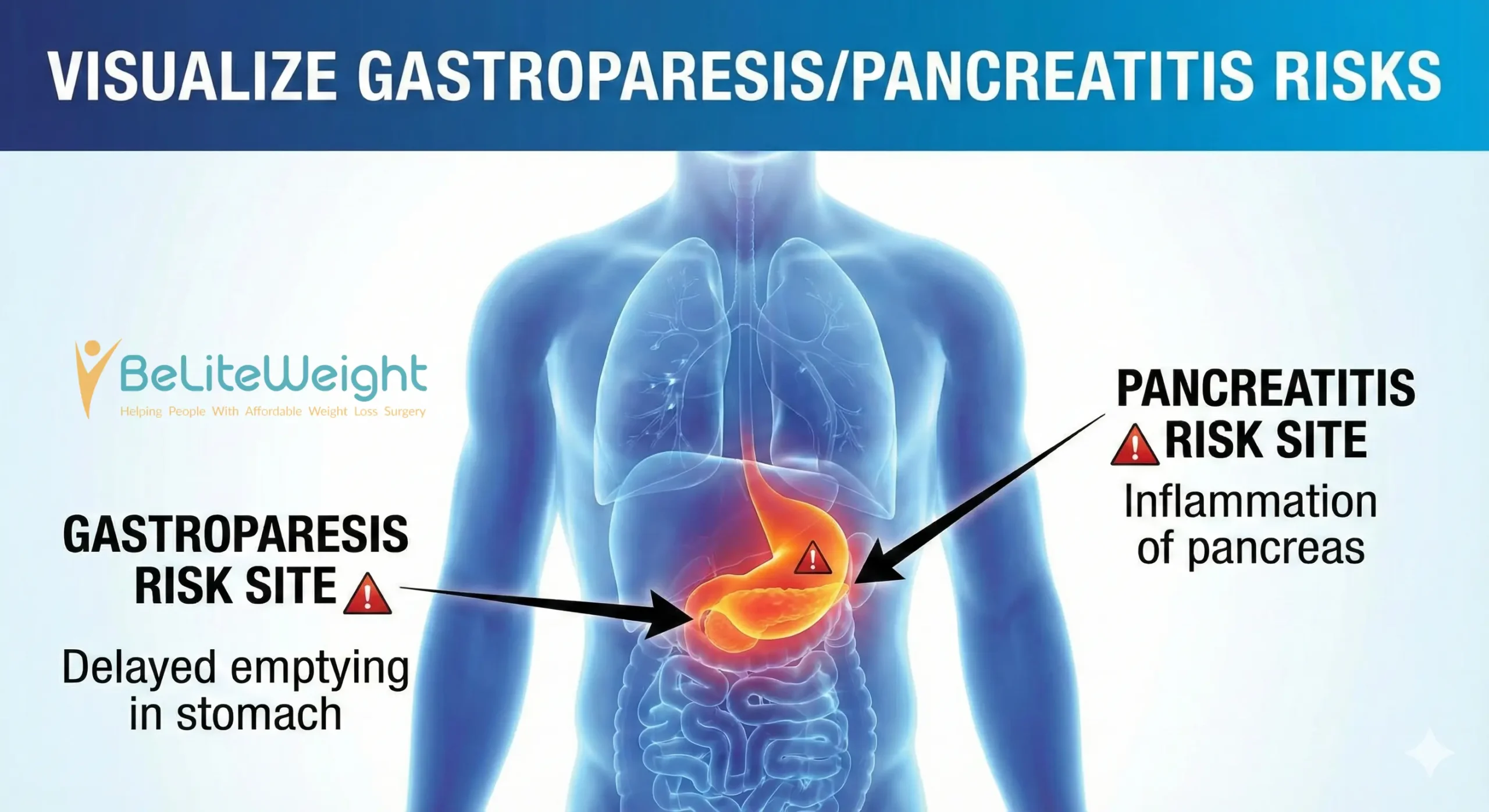
Cost & Durability: The “Forever Factor”
This is the elephant in the room that most ads do not mention.
GLP-1s Require Ongoing Use
These medications only work while you’re on them.
If injections stop, appetite typically returns, and weight regain is common.
Monthly Costs Add Up
GLP-1 medications can cost:
-
$900–$1,400 per month without insurance
-
Even with insurance, coverage can be inconsistent or stop once weight plateaus
Bariatric Surgery Is a One-Time Investment
Procedures such as the:
are one-time procedures with long-term metabolic benefits—not recurring monthly costs.
For many patients, surgery ends up being more affordable than years of medication.
GLP-1 vs. Bariatric Surgery: A Comprehensive Comparison
Below is an expanded, SEO-optimized table that includes the crucial “duration” and “rebound” factors.
GLP-1 Medications vs. Bariatric Surgery
| Feature | GLP-1 Medications (Ozempic/Mounjaro) | Bariatric Surgery (Sleeve/Bypass) |
|---|---|---|
| Avg. Weight Loss | 15–20% | 25–40% |
| Duration of Treatment | Indefinite (weekly injections) | One-time procedure |
| Rebound Risk | High if medication is stopped | Low with proper lifestyle |
| Metabolic Impact | Moderate improvements | Strong, long-lasting metabolic changes |
| Best For | Moderate weight loss / non-surgical path | High BMI / Type 2 diabetes remission |
| Cost Over Time | High monthly cost; often not covered | One-time investment; often insurance eligible |
| Long-Term Stability | Depends on continued use | Generally predictable & durable |
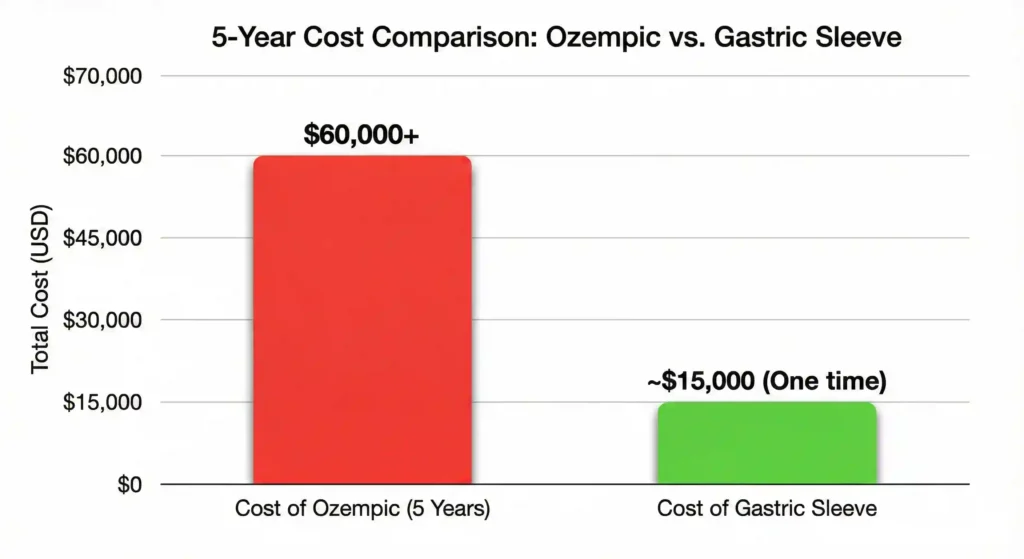
GLP-1 medications are a breakthrough in science, but they aren’t a magic wand.
Don’t rent your weight loss. Own it.
Stop paying monthly fees for temporary results. Bariatric surgery is a one-time investment with lifetime benefits. See the difference for yourself:






